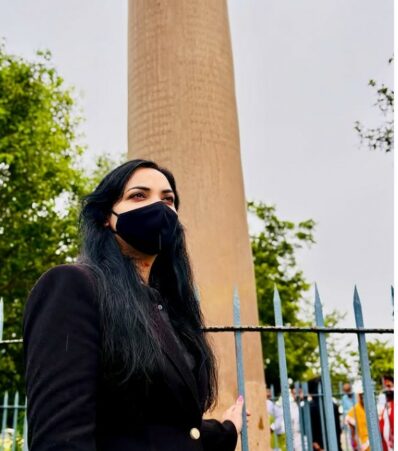
Pushpam Priya Chaudhary, the UK-educated founder of the Plurals Party, officially re-entered the fray of the Bihar Assembly elections on Saturday by filing her nomination from the Darbhanga constituency. Dressed entirely in her trademark black attire and wearing a black mask, she reiterated her pledge to remove the mask only once she secures an electoral victory.
Born on June 13, 1987, Pushpam Priya is the daughter of former JDU MLA Vinod Kumar Chaudhary and granddaughter of Professor Umakant Chaudhary, a founding member of the Samata Party and close associate of Chief Minister Nitish Kumar. After completing her schooling in Darbhanga and undergraduate studies in Pune, she earned master’s degrees in Development Studies from the University of Sussex and in Public Administration from the London School of Economics. Before launching her political career, she served as a consultant to Bihar’s tourism and health departments.
In 2020, she formally entered politics by founding the Plurals Party with the explicit aim of transcending caste and communal divides. At that time, she ambitiously declared herself her party’s chief ministerial candidate in full‐page newspaper advertisements. Although the Plurals Party could contest only 148 seats in 2020, it fielded candidates in all 243 constituencies in 2025, reserving half of them for women.
Speaking to reporters after submitting her nomination, Pushpam Priya emphasized inclusivity and development: “Plurals means all people—irrespective of caste or religion—working together for progress. I don’t know why politicians wear white, so I wear black,” she explained. Her campaign slogan—“Education, Employment, Irrigation, Health, Justice, and Action”—reflects her promise to build a Bihar that is free from youth unemployment, poverty, and migration.
The Plurals Party was allotted the “city” symbol and plans to leverage its fresh, reform-oriented agenda to challenge the state’s established caste equations. Pushpam Priya’s unorthodox style and mask vow have drawn significant media attention, making her one of the most watched new faces in Bihar’s 2025 polls.
As campaigning intensifies across the state ahead of voting on November 6 and 11, Pushpam Priya faces the critical test of translating her outsider appeal into tangible votes in Darbhanga—a constituency historically dominated by established political families. Her performance will indicate whether Bihar’s electorate is ready to embrace a new brand of politics focused on pluralism and policy over patronage.